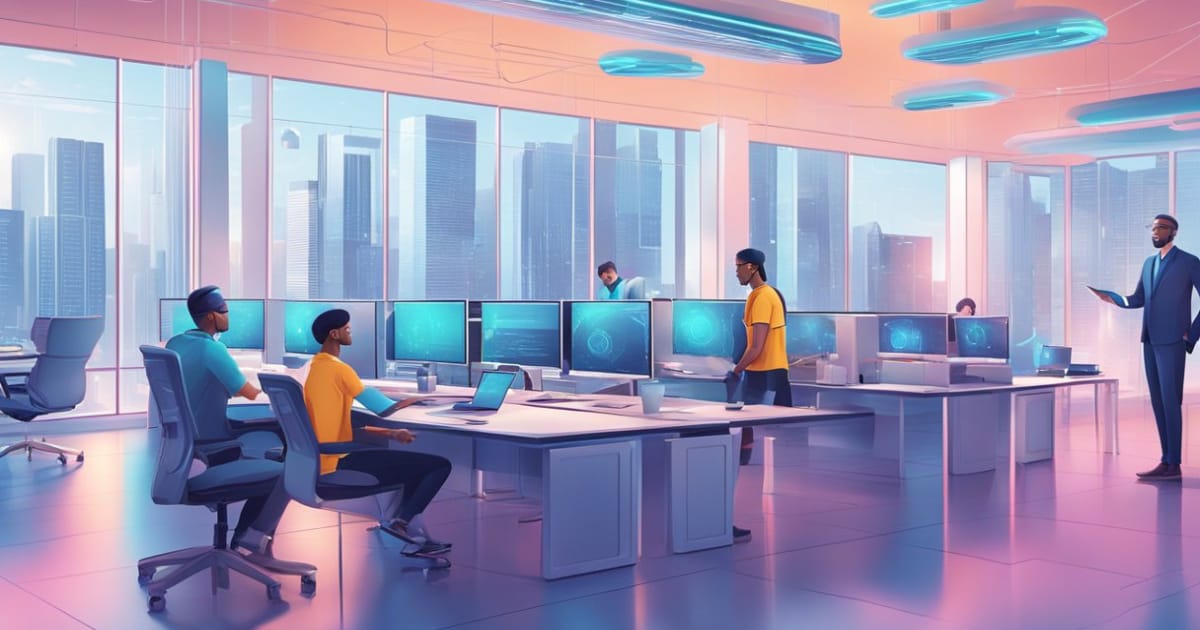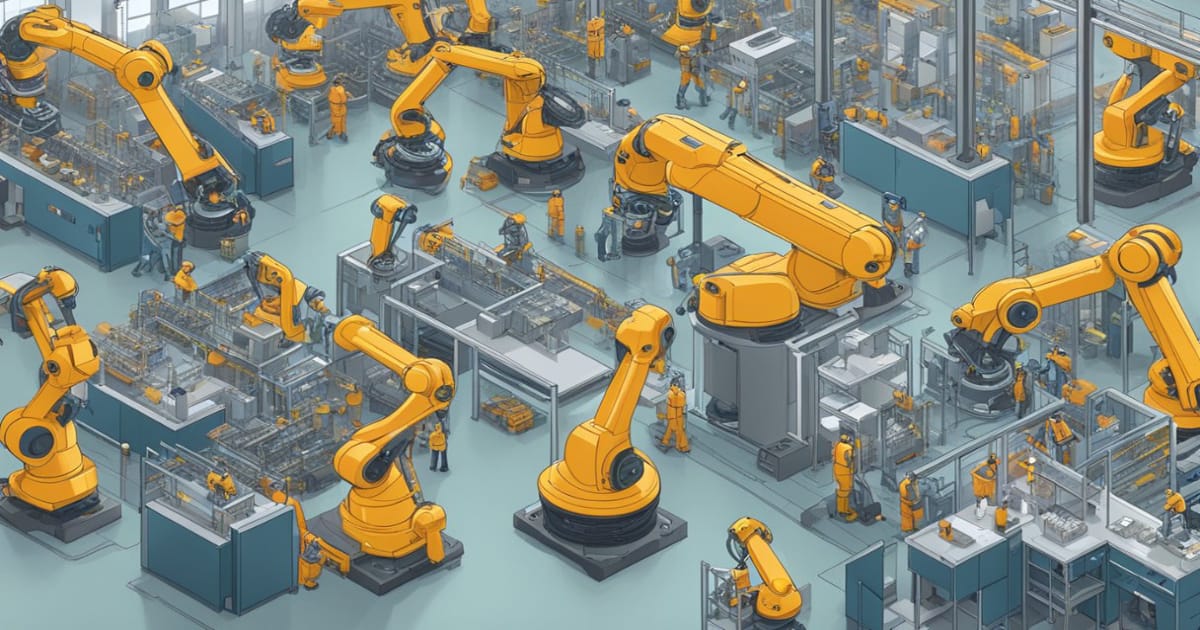What is [Gen AI] and the Future of Work in 2024?
![Cosmico - What is [Gen AI] and the Future of Work?](/content/images/size/w1200/2024/01/gen_ai_generation_ai_future_of_work_2024_cosmico_business_tech_insights.jpg)
Gen AI, or Generative Artificial Intelligence, is a term used to describe the growing population of artificially intelligent beings. These beings are not human, but rather digital entities that can perform a variety of tasks and functions. Gen AI is becoming increasingly prevalent in our society, and its impact on the future of work is a topic of much discussion.
The future of work is rapidly changing, and Gen AI is at the forefront of this change. As more and more companies adopt artificial intelligence technology, the role of human workers is evolving. Some people worry that Gen AI will replace human workers entirely, while others believe that it will create new jobs and opportunities. Regardless of what the future holds, it is clear that Gen AI will play a significant role in shaping the way we work in the years to come.
In this article, we will explore what Gen AI is and how it is changing the future of work. We will look at the benefits and challenges of working with artificially intelligent beings, and we will examine some of the ways that companies are using Gen AI to improve their operations. Whether you are a business owner, a worker, or simply someone who is interested in the future of work, this article will provide you with valuable insights into this exciting and rapidly evolving field.
Understanding Generative AI

Defining Generative AI
Generative AI is a type of artificial intelligence that has the ability to create and generate new content, such as images, videos, and even text. It is different from other forms of AI, such as predictive or prescriptive AI, which are designed to analyze data and make predictions based on that data.
Generative AI is based on deep learning, which is a type of machine learning that uses neural networks to analyze and generate new data. These neural networks are designed to mimic the way the human brain works, allowing them to learn and adapt over time.
Evolution and Current Capabilities
Generative AI has come a long way since its inception. Early versions of generative AI were limited in their capabilities, but recent advancements in technology have allowed for more complex and sophisticated models.
Today, generative AI is being used in a variety of industries, including healthcare, finance, and entertainment. For example, generative AI is being used to create realistic medical simulations that can help doctors and nurses practice complex procedures. In finance, generative AI is being used to create new investment strategies and predict market trends.
Generative AI in the Technology Landscape
Generative AI is just one of many technologies that are changing the way we live and work. As technology continues to evolve, we can expect to see even more advancements in the field of AI.
Innovation in AI is not without its challenges, however. As AI becomes more sophisticated, there are concerns about the impact it will have on jobs and the workforce. Some experts predict that AI will replace many jobs, while others believe that it will create new opportunities and industries.
Impact of Gen AI on Work

As Gen AI continues to evolve, it is expected to have a significant impact on the way we work. Here are some of the ways in which Gen AI is expected to transform the world of work.
Transforming Job Descriptions
Gen AI is expected to transform many job descriptions, making them more efficient and effective. Tasks that are repetitive or mundane can be automated, freeing up time for more creative and strategic work. This will require workers to adapt to new roles and responsibilities, as well as new technologies.
AI and the Workforce
With the rise of Gen AI, there is a growing concern that machines will replace human workers. However, many experts believe that AI will actually enhance the workforce, rather than replace it. By automating routine tasks, AI can free up workers to focus on more complex and creative work. This will require workers to develop new skills and competencies, such as data analysis, problem-solving, and creativity.
Productivity and Efficiency Gains
One of the key benefits of Gen AI is that it can significantly increase productivity and efficiency in the workplace. By automating routine tasks, AI can reduce errors and increase output. This can help businesses to achieve their goals more quickly and effectively.
Changing Skill Sets and Reskilling
As AI continues to transform the workplace, workers will need to develop new skills and competencies to keep up. This will require a significant investment in reskilling and upskilling programs, as well as a shift in the way we think about education and training. Workers will need to be able to adapt quickly to new technologies and work processes in order to remain competitive in the job market.
Overall, the impact of Gen AI on work is expected to be significant. While there may be some challenges along the way, the benefits of AI are clear. By automating routine tasks and enhancing the workforce, AI can help businesses to achieve their goals more quickly and effectively. However, workers will need to be prepared to adapt to new roles and responsibilities, as well as new technologies.
Generative AI in Business and Industry

As Generative AI continues to evolve, businesses across various sectors are beginning to recognize its potential. From streamlining manufacturing processes to improving marketing strategies, Generative AI is transforming the way businesses operate.
Use Cases Across Sectors
Generative AI has a wide range of use cases across different sectors. In healthcare, it can be used to analyze medical images and assist in the diagnosis of diseases. In finance, it can be used to detect fraudulent activities and improve risk management. In transportation, it can be used to optimize routes and reduce fuel consumption. The possibilities are endless, and businesses are constantly finding new ways to leverage Generative AI to improve their operations.
Automation and the Future of Manufacturing
Generative AI is also transforming the manufacturing industry. By automating repetitive tasks, it can help businesses reduce costs and improve efficiency. For example, it can be used to optimize the design of products and reduce the time it takes to bring them to market. It can also be used to monitor machines and predict when maintenance is required, reducing downtime and increasing productivity.
AI in Marketing and Sales
Generative AI is also being used in marketing and sales to improve customer engagement and increase sales. It can be used to analyze customer data and predict their behavior, allowing businesses to tailor their marketing strategies to specific audiences. It can also be used to create personalized content, such as product recommendations and targeted ads, which can lead to higher conversion rates.
Innovative Solutions in E-Commerce
E-commerce is another area where Generative AI is making a significant impact. By analyzing customer data, it can be used to create personalized shopping experiences, such as personalized product recommendations and targeted promotions. It can also be used to optimize pricing strategies and improve supply chain management.
Generative AI is transforming the way businesses operate across various sectors. By automating repetitive tasks and providing valuable insights, it is helping businesses reduce costs, improve efficiency, and increase sales. As the technology continues to evolve, we can expect to see even more innovative solutions in the future.
The Human-AI Collaboration

As AI continues to advance, many people worry that it will replace human workers. However, the reality is that AI is more likely to augment human workers than replace them. In fact, the most successful companies will be those that find ways to combine the strengths of both humans and AI.
Augmenting Human Tasks with AI
AI can be used to augment human tasks in a variety of ways. For example, it can help with data analysis, language translation, and image recognition. By using AI to assist with these tasks, humans can focus on the more creative and complex aspects of their work.
AI Assistants and Customer Service
One area where AI is already being used extensively is in customer service. AI assistants can help customers with simple tasks such as checking their account balance or tracking a package. This frees up human customer service agents to deal with more complex issues.
Leadership and AI Strategy
Leadership is another area where AI can be useful. AI can help leaders make more informed decisions by providing them with data-driven insights. However, it's important for leaders to have a clear AI strategy in place to ensure that AI is being used effectively and ethically.
The future of work will be a collaboration between humans and AI. By using AI to augment human tasks, companies can increase productivity and efficiency while also allowing humans to focus on the more creative and complex aspects of their work. Additionally, AI can be used to assist with customer service and provide leaders with data-driven insights. It's important for companies to have a clear AI strategy in place to ensure that AI is being used effectively and ethically.
Risks and Challenges of Generative AI

Generative AI has the potential to revolutionize many industries, but it also poses several risks and challenges that need to be addressed. In this section, we will discuss some of the ethical considerations, regulatory frameworks, and accuracy concerns associated with generative AI.
Ethical Considerations and Risks
One of the main concerns with generative AI is that it may be used to create fake content such as deepfakes, which can be used for malicious purposes such as spreading misinformation or defaming individuals. This raises ethical concerns about the potential misuse of generative AI and the need for responsible use.
Another ethical consideration is the potential for generative AI to perpetuate existing biases and discrimination. If the training data used to develop generative AI models is biased, the resulting output will also be biased. This can lead to discrimination against certain groups of people and perpetuate social inequalities.
Regulatory Frameworks and Compliance
Generative AI is a relatively new technology, and there is currently no comprehensive regulatory framework in place to govern its use. This can lead to issues such as data privacy violations and misuse of generative AI for malicious purposes.
The General Data Protection Regulation (GDPR) is a set of regulations that govern the use of personal data in the European Union. Companies that use generative AI must comply with GDPR regulations to ensure that they are handling personal data responsibly.
Addressing AI Bias and Accuracy
Generative AI models are only as accurate as the data used to train them. If the training data is biased or incomplete, the resulting generative AI output will also be biased or inaccurate. To address this issue, it is important to use diverse and representative training data and to continually monitor and adjust the generative AI models to ensure accuracy.
Another challenge is addressing AI bias. This can be done by auditing the training data and the generative AI models to identify and correct any biases. Additionally, it is important to involve diverse groups of people in the development and testing of generative AI models to ensure that they are fair and unbiased.
The Future of Work with Generative AI

As generative AI becomes increasingly sophisticated, it has the potential to revolutionize the way we work. Here are some ways in which generative AI could impact the future of work.
Predicting Long-Term Impacts
One of the most significant impacts of generative AI on the future of work is its ability to predict long-term impacts. By analyzing data and making predictions based on that data, generative AI can help organizations make better decisions about the future. For example, generative AI can help organizations predict which products or services will be successful in the long term, which can help them make strategic decisions about where to invest their resources.
Adaptability and the Evolving Workplace
Generative AI can also help organizations become more adaptable to change. As the workplace evolves, organizations need to be able to adapt quickly to new technologies and changing market conditions. Generative AI can help organizations identify areas where they need to adapt and provide them with the tools and resources they need to do so.
Vision for a Future Integrated with AI
The future of work with generative AI is one where humans and machines work together seamlessly. Generative AI can take on repetitive or mundane tasks, freeing up humans to focus on more creative and strategic work. This can lead to greater job satisfaction and productivity, as well as better outcomes for organizations.
The future of work with generative AI is one that is full of potential. While there are certainly challenges to be overcome, the benefits of generative AI are clear. By embracing this technology, organizations can become more adaptable, make better decisions, and create a future that is integrated with AI.
Final Thoughts
As you have learned, Gen AI is a new generation of intelligent machines that are capable of learning and evolving on their own. This technology has the potential to revolutionize the way we work and live, and it is important that we understand its capabilities and limitations.
One of the key factors for success with Gen AI will be our ability to adapt and integrate this technology into our current systems and processes. This will require a significant investment of time and resources, but the potential outcomes are immense.
Some of the potential outcomes of Gen AI include increased efficiency, improved accuracy, and the ability to process and analyze vast amounts of data in real-time. These outcomes have the potential to transform industries such as healthcare, finance, and manufacturing.
However, it is important to note that there are also potential risks associated with Gen AI. These risks include job displacement, privacy concerns, and the potential for bias in decision-making processes. It is important that we address these risks and work towards developing solutions that mitigate them.
Overall, the future of work with Gen AI is both exciting and challenging. It is up to us to ensure that we are prepared for this new era of technology and that we use it to create a better future for ourselves and for future generations.





